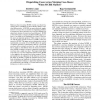Free Online Productivity Tools
i2Speak
i2Symbol
i2OCR
iTex2Img
iWeb2Print
iWeb2Shot
i2Type
iPdf2Split
iPdf2Merge
i2Bopomofo
i2Arabic
i2Style
i2Image
i2PDF
iLatex2Rtf
Sci2ools
FLAIRS
2003
2003
Dispatching Cases versus Merging Case-Bases: When MCBR Matters
Multi-case-base reasoning (MCBR) extends case-based reasoning to draw on multiple case bases that may address somewhat different tasks. In MCBR, an agent selectively supplements its own case-base as needed, by dispatching problems to external case-bases and using cross-case-base adaptation to adjust their solutions for inter-case-base differences. MCBR is often advocated as a means to facilitate handling large casebases, or to enable use of distributed case sources. However, this raises an important question: When storage is not an issue, and the entire external case-base is available, is there any reason for MCBR? This paper answers that question with an experimental assessment of how MCBR affects the quality of solutions generated. It demonstrates that for a given local case-base and an external case-base for a task environment that is similar to, but different from, the local task environment, MCBR can improve accuracy compared to merging the case-bases into a single case-base. Thi...
Artificial Intelligence | Cross-case-base Adaptation | Entire External Case-base | External Case-base | FLAIRS 2003 |
| Added | 31 Oct 2010 |
| Updated | 31 Oct 2010 |
| Type | Conference |
| Year | 2003 |
| Where | FLAIRS |
| Authors | David B. Leake, Raja Sooriamurthi |
Comments (0)

